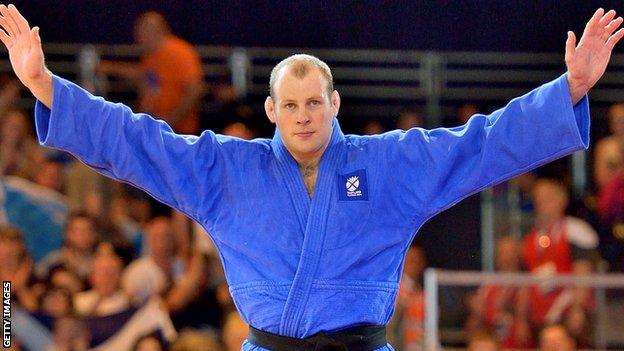Chris Sherrington: How Royal Marines spirit helped judoka recover from serious knee injuries
- Published

Chris Sherrington won heavyweight gold at Glasgow 2014, two years after reaching the second round at the Olympics
"When you get to three-and-a-half or four minutes of flat out in a fight, you need to look inside your own soul and you need to ask yourself 'do I want to be here?' That's where Royal Marines Commandos come in.
"When the cards are down and the times are tough, they just look inside themselves and dig deep - we're built this way."
Chris Sherrington is no stranger to the Commonwealth Games, but the Royal Marine Corporal has needed to use all that legendary grit and determination found in some of the UK's most elite marines to make his return to the mat this summer.
The Lancashire-born fighter, who won heavyweight gold at the 2014 Commonwealth Games in Glasgow, will don his gi in Birmingham having torn the anterior cruciate ligaments in both his knees.
It meant Sherrington, who was part of Team GB at London 2012, missed out on a chance to compete at the delayed Tokyo Olympics last year and faced a race against time to be fit enough for Birmingham.
"It's kind of crazy really," says Sherrington, who is part of the Commando Logistic Regiment based at Chivenor in north Devon.
"Originally the doctor said to me 'you will not be back on the mat until after 12 months', which would have not allowed me to qualify for the Commonwealth Games.
"We were about a month out from the nine-and-a-half month mark and I said to the doctor 'I'm feeling pretty good' and he was like 'don't push it', but when we got to the nine-and-a-half month mark it was really solid, everything seemed very good.
"So we booked ourselves in for three tournaments, so I was back training for three weeks and then I went into three competitions," he told BBC Radio Devon.
'You just want to be the best'

Chris Sherrington won Scotland's sixth judo gold of the 2014 Commonwealth Games
Despite being born in England, Sherrington represents Scotland, having trained at Edinburgh Judo Club and been supported by Sport Scotland - without whose support he does not feel he would have made a comeback from two serious knee injuries.
The 38-year-old says judo is what has helped him cope with stress and alcohol problems he suffered having seen active service in Iraq.
"When you go through Royal Marines basic training it changes you," he explained.
"Your competitiveness is boosted and you want to be the best at whatever you're doing - it doesn't really matter what you're doing, you just want to be the best and push it as far as you can.
"I fell into judo after doing a tour of Iraq and I needed to vent - rugby didn't cut it, football didn't cut it.
"I did judo for a year when I was a kid so I knew how hard it was, so I threw myself into the judo and within 12 months I was third in Britain and 12 months after that I was number one in Britain.
The navy then gave Sherrington a full-time sports draft, allowing him to concentrate fully on the sport.
"This whole journey that I've been on has been an absolutely crazy ride which I never intended to do, and that's also my drive because I feel that because I've been given this opportunity I should push through with it," he said.
So can Sherrington repeat the gold he won in the 100kg+ category eight years ago when he takes to the mat in Birmingham?
"I feel pretty confident in myself," he said. "My technical ability is all good and it's come back quite well.
"The main thing for me is building explosive muscle mass, because as a Royal Marine Commando you do a lot of runs and you tend to have a body type more for endurance.
"The last couple of months I've tried to change my body shape from endurance running to more explosive stuff, and it takes time, so hopefully on the day we'll be explosive enough, and both my explosive strength and technical ability will come together and it'll get us a gold."